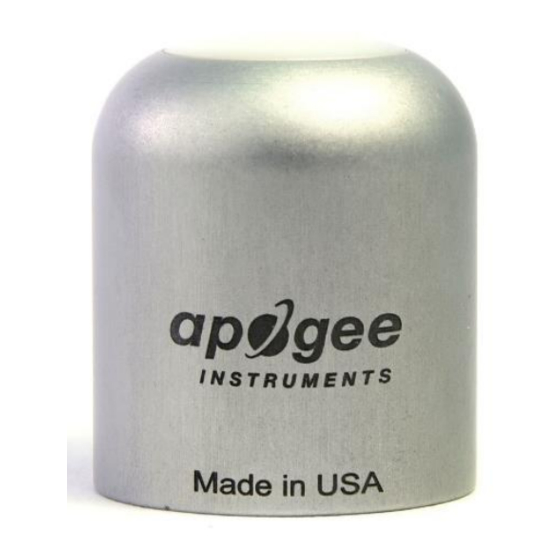Apogee SQ-618 Benutzerhandbuch - Seite 4
Blättern Sie online oder laden Sie pdf Benutzerhandbuch für Zubehör Apogee SQ-618 herunter. Apogee SQ-618 19 Seiten. Epar sensor

INTRODUCTION
Radiation that drives photosynthesis is called photosynthetically active radiation (PAR) and, historically, is defined
as total radiation across a range of 400 to 700 nm. PAR is almost universally quantified as photosynthetic photon
-2
-1
flux density (PPFD) in units of micromoles per square meter per second (µmol m
s
, equal to microEinsteins per
square meter per second) summed from 400 to 700 nm (total number of photons from 400 to 700 nm). However,
ultraviolet and far-red photons outside the defined PAR range of 400-700 nm can also contribute to
photosynthesis and influence plant responses (e.g., flowering).
Sensors that measure PPFD are often called quantum sensors due to the quantized nature of radiation. A quantum
refers to the minimum quantity of radiation, one photon, involved in physical interactions (e.g., absorption by
photosynthetic pigments). In other words, one photon is a single quantum of radiation. Sensors that function like
traditional quantum sensors, but measure a wider range of wavelengths can be thought of as an 'extended range'
quantum sensor.
Typical applications of traditional quantum sensors include incoming PPFD measurement over plant canopies in
outdoor environments or in greenhouses and growth chambers, and reflected or under-canopy (transmitted) PPFD
measurement in the same environments. The extended photosynthetically active radiation (ePAR) sensor detailed
in this manual uses a detector that is sensitive to radiation from 380-760 nm, which allows it to measure photons
from UV and Far-red.
Apogee Instruments SQ-600 series ePAR sensors consist of a cast acrylic diffuser (filter), photodiode, and signal
processing circuitry mounted in an anodized aluminum housing. A cable to connect the sensor to a measurement
device is also included. SQ-600 series ePAR sensors are designed for continuous photon flux density measurements
in indoor or outdoor environments. The SQ-618 sensors output a digital signal using Modbus RTU protocol over RS-
232 or RS-485.
